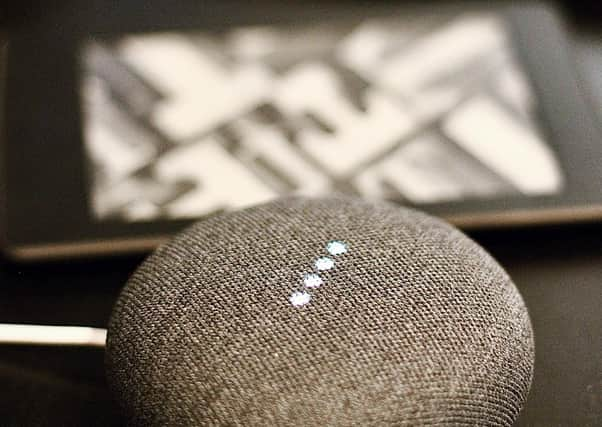BBC voice assistant that speaks with a Northern accent – just like in the war


As recently as the 1980s, the controller of Radio 4 was receiving complaints that the shipping forecast had been entrusted to a newsreader with a Scots lilt.
However, today it’s received pronunciation that is out of fashion, and the corporation’s latest development is proof if proof were needed. “Beeb” is a voice assistant similar to Amazon Alexa. You talk to it and it talks back to you.
Advertisement
Hide AdAdvertisement
Hide AdThe BBC announced last year that it was developing such a product, to a reaction of mostly raised eyebrows from commentators who warned that it would never be able to compete with either Amazon or the other tech giants, whose smart speakers are now in an estimated one in five homes.
Now, the first iteration of Beeb has been released for public testing, with what its developers describe as a “warm and friendly” male Northern voice to differentiate it from the mid-Atlantic female tones of its rivals.
The idea is that you say to it, “Hey, Beeb – what’s the weather going to be like today?” and it proceeds to tell you in a synthetic Wilfred Pickles voice. It will also play on-demand radio, podcasts, news and jokes from BBC2’s QI and The Mash Report. This is a very limited set of functions, but the intention is that it will grow eventually into something more useful.
The BBC says it picked a masculine Northern voice so that no-one would think it subservient or sterile. But what is the point of having a voice assistant at all, especially as the BBC has no intention of producing its own physical hardware to compete with Amazon’s Echo or Google Home devices? The answer is in the data that those systems and others collect. If we all start using them, the corporation is worried that they will undermine it by recommending their own programmes in preference to those from Broadcasting House. “The threat to us is, ‘You’ve finished The Archers, here’s a Joe Rogan podcast’,” said Grace Boswood, of the BBC’s design and engineering department, referring to a presenter who is a sort of American Ben Archer, but less lifelike.
Advertisement
Hide AdAdvertisement
Hide AdThe worry is well-founded. The BBC has already been displaced on many smart TVs by Netflix and other streaming services which load by default when you turn the set on, rather than BBC1 or the channel you last watched. Now, podcasts from both sides of the Atlantic are eroding Radio 4’s monopoly on non-news, speech radio, and this at a time when the corporation it is fighting to justify the continuance of the licence fee.
But the use of the kind of “artificial intelligence” software on which Beeb relies is not without controversy. There was disquiet last year when it emerged that big companies were recording conversations with users, in order to “improve” their voice assistants, and the BBC has not ruled out taking a similar approach, although it says it will not do so by default or without permission.
The hope is that Beeb will be built into several existing and future platforms, possibly including Amazon’s, as well as the BBC’s own Sounds app and perhaps car stereos. For the time being, you can hear the Wilfred Pickles of the future by joining the early adopters in trying out the embryo version. This involves signing up to the Windows Insider programme from a PC and then downloading Beeb from the Microsoft app store, using your BBC iPlayer account details.
Editor’s note: first and foremost - and rarely have I written down these words with more sincerity - I hope this finds you well.
Advertisement
Hide AdAdvertisement
Hide AdAlmost certainly you are here because you value the quality and the integrity of the journalism produced by The Yorkshire Post’s journalists - almost all of which live alongside you in Yorkshire, spending the wages they earn with Yorkshire businesses - who last year took this title to the industry watchdog’s Most Trusted Newspaper in Britain accolade.
And that is why I must make an urgent request of you: as advertising revenue declines, your support becomes evermore crucial to the maintenance of the journalistic standards expected of The Yorkshire Post. If you can, safely, please buy a paper or take up a subscription. We want to continue to make you proud of Yorkshire’s National Newspaper but we are going to need your help.
Postal subscription copies can be ordered by calling 0330 4030066 or by emailing [email protected]. Vouchers, to be exchanged at retail sales outlets - our newsagents need you, too - can be subscribed to by contacting subscriptions on 0330 1235950 or by visiting www.localsubsplus.co.uk where you should select The Yorkshire Post from the list of titles available.
If you want to help right now, download our tablet app from the App / Play Stores. Every contribution you make helps to provide this county with the best regional journalism in the country.
Sincerely. Thank you.
James Mitchinson, Editor
Comment Guidelines
National World encourages reader discussion on our stories. User feedback, insights and back-and-forth exchanges add a rich layer of context to reporting. Please review our Community Guidelines before commenting.